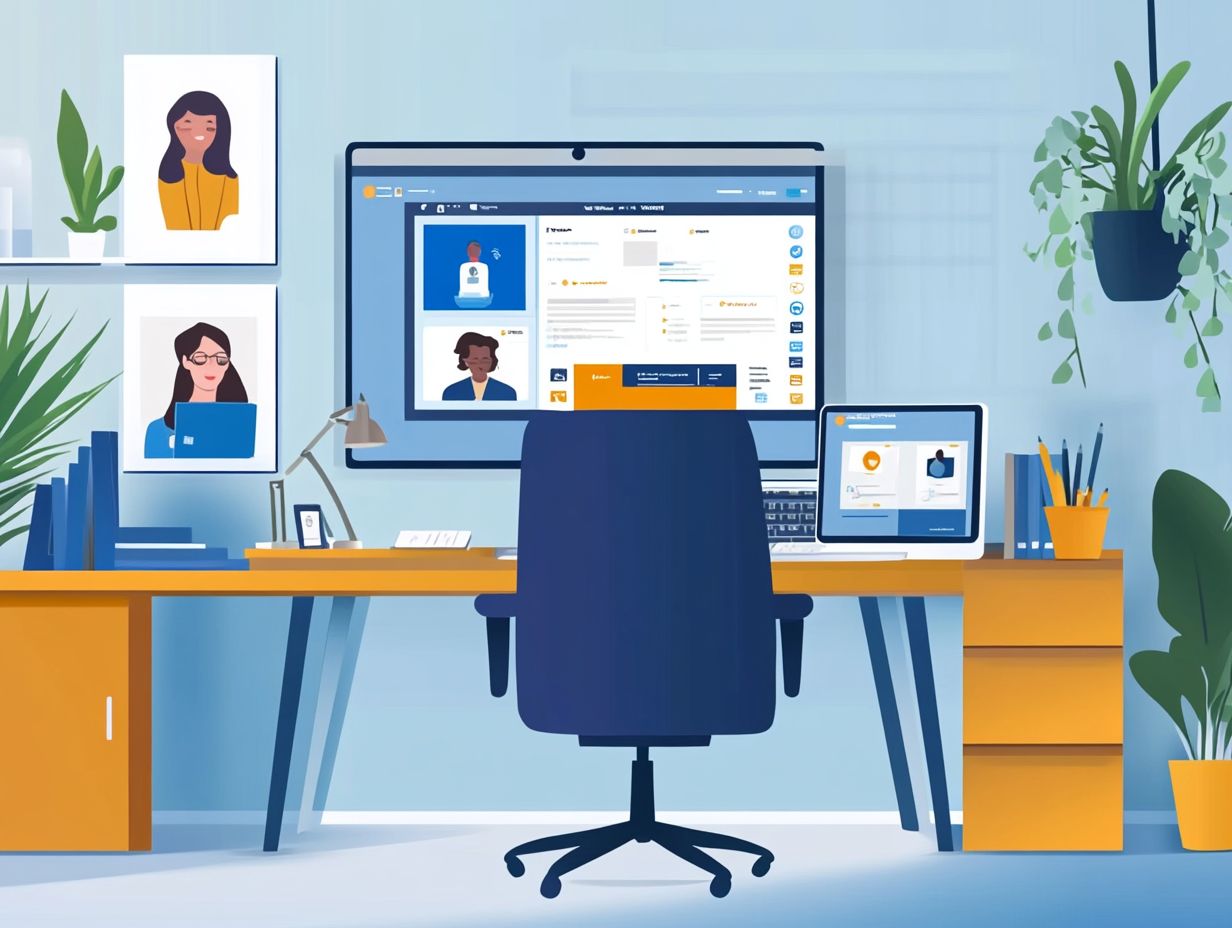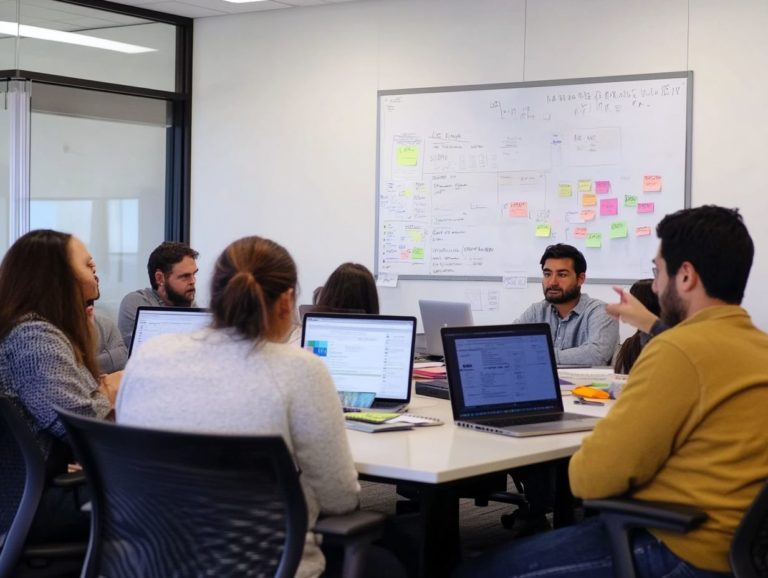“5 Best Practices for Remote CRM User Training”
In today s fast-paced digital landscape, effective remote training for CRM (Customer Relationship Management) users is more crucial than ever. With your teams spread across various locations, mastering CRM tools can indeed present a challenge.
This article outlines five best practices to ensure your remote CRM user training is comprehensive, engaging, and effective.
From starting with the essentials to fostering collaboration, you ll explore key strategies that enhance learning and drive results. We ll tackle common challenges and highlight the tangible benefits for your business and employees.
Dive in and discover how to elevate your remote training program to new heights!
Contents
- Key Takeaways:
- 1. Start with the Basics
- 2. Utilize Interactive and Engaging Training Methods
- 3. Provide Ongoing Support and Resources
- 4. Encourage Collaboration and Communication
- 5. Regularly Evaluate and Update Training Program
- Why Is Remote CRM User Training Important?
- What Are the Key Features of a Successful Remote CRM User Training Program?
- How Can a Business Make Remote CRM Training Effective?
- What Are the Common Challenges of Remote CRM User Training?
- How Can a Business Measure the Success of Remote CRM User Training?
- What Are the Benefits of Remote CRM User Training for the Business and Employees?
- Frequently Asked Questions
- What are the 5 best practices for remote CRM user training?
- Why is it important to provide clear and concise instructions during remote CRM user training?
- How can interactive training sessions benefit remote CRM users?
- What role do visual aids and demos play in remote CRM user training?
- Why is ongoing support and resources important for remote CRM user training?
- How can incorporating real-life scenarios into training benefit remote CRM users?
Key Takeaways:

Start with the basics to build a strong foundation.
Use hands-on methods that keep everyone engaged and motivated.
Offer ongoing support to help everyone master their CRM skills.
1. Start with the Basics
Starting with the basics is essential for effective CRM training. It lays the groundwork for understanding core functionalities, especially in an online learning environment.
Focus on key concepts like user adoption, data integrity, and customer relationships. This helps your organization develop a robust training strategy tailored to its specific needs while reinforcing digital transformation initiatives.
Make the training exciting and relevant by assessing your current skills. This enables the design of a structured training environment that caters to diverse learning preferences.
You can incorporate both live training sessions, such as workshops and webinars, and self-paced options like interactive e-learning resources.
By offering this blend of approaches, your business can enhance employee engagement, foster knowledge retention, and drive successful CRM implementation.
2. Utilize Interactive and Engaging Training Methods
Utilizing interactive and engaging training methods is essential for enhancing your team s support and ensuring effective user adoption of CRM systems. This approach fosters a more immersive learning experience that truly resonates.
Incorporate hands-on training sessions to allow participants to engage with the CRM in a low-stakes environment. Here, they can practice using the system without pressure.
In-app guidance tools offer instant feedback and support as users navigate various features, making the learning process seamless and intuitive.
These methods not only aid in understanding the software but also boost information retention through real-life scenarios that reflect actual sales situations.
Emphasizing online etiquette during training sessions nurtures positive communication and collaboration among team members, making the experience both effective and enjoyable.
When sales teams are actively engaged, they re more likely to remember what they ve learned and apply it effectively in their daily tasks.
3. Provide Ongoing Support and Resources
Providing ongoing support and resources is essential for continuous learning. It ensures you stay proficient in CRM features and are equipped to meet important performance metrics.
This approach enhances your skill set and cultivates a culture of continuous improvement within the organization.
Regular check-ins become a cornerstone for ongoing training, allowing managers to assess your progress and tackle challenges head-on.
Integrating performance support tools offers immediate access to vital information and resources when you need them most.
Establishing feedback loops creates channels for sharing insights and suggestions, promoting personal and team growth.
With digital communication tools at your disposal, organizations can facilitate real-time feedback, making it easier to learn from experiences and quickly adapt to performance expectations.
Ready to transform your team s CRM skills? Let s get started!
4. Encourage Collaboration and Communication

Encouraging teamwork among your sales teams is vital for creating an engaging training environment. This fosters shared knowledge and helps everyone adapt to the CRM system.
Group training sessions can facilitate interactive discussions and build camaraderie. They enable team members to learn from each other and tackle challenges together.
Using effective digital communication tools enhances engagement. They allow for seamless information exchange and real-time collaboration.
When team members feel connected, their understanding of the CRM deepens. This creates a cohesive atmosphere where everyone is invested in successful implementation.
5. Regularly Evaluate and Update Training Program
Regular evaluations of your training program ensure it stays effective. This keeps your team aligned with the changing needs of your organization.
Methods like surveys and performance reviews provide valuable insights into the training’s impact. They highlight areas for improvement and enhance your understanding of the market.
Using feedback from participants allows for a more tailored learning experience. It helps to adapt to new trends and technologies.
This ongoing refinement boosts the training’s value and empowers your employees to contribute effectively to your goals.
Why Is Remote CRM User Training Important?
Remote CRM training is crucial as organizations face digital transformation challenges. It ensures your team can engage with CRM systems from anywhere.
Flexible scheduling and self-paced learning allow access to essential resources at your convenience. You and your colleagues benefit from this approach.
Integrating remote training into your strategy boosts your confidence with software applications. This flexibility supports digital transformation and encourages innovation.
As your team becomes adept at using these tools, user adoption improves. This fosters a more engaged workforce and drives growth.
What Are the Key Features of a Successful Remote CRM User Training Program?
A successful program includes tailored content, clear metrics, and ongoing support. These features maximize user adoption and engagement.
The program should adapt to different learning styles. Whether you learn best visually or through hands-on experiences, you should benefit.
Real-time feedback helps trainers assess understanding instantly. This allows for immediate adjustments to the training approach.
Hands-on training ensures you can apply concepts practically. This solidifies your learning and boosts your confidence.
These elements create an engaging learning atmosphere. They foster knowledge retention and boost your enthusiasm and commitment.
How Can a Business Make Remote CRM Training Effective?

To make your remote CRM training effective, you need a comprehensive strategy that incorporates employee feedback and prioritizes data privacy. Using top-notch training materials is also essential.
By actively analyzing participant input, you can pinpoint areas for improvement. This iterative approach refines your programs to better meet user needs, fostering a more engaging experience.
Prioritizing data privacy builds trust with your employees and encourages them to share their insights openly. Best practices like anonymizing feedback data and using secure communication platforms help safeguard sensitive information.
This strong emphasis on confidentiality boosts user confidence, leading to enhanced training outcomes and greater productivity.
What Are the Common Challenges of Remote CRM User Training?
Common challenges of remote CRM user training include online training effectiveness, managing change, and ensuring a positive user experience throughout the digital adoption journey.
These obstacles can manifest as technological barriers, where inadequate software or connectivity issues hinder learning significantly. Employees may feel disconnected from the training experience, leading to disengagement and dwindling motivation.
Organizations must recognize that one-size-fits-all training rarely resonates with everyone. This underscores the need for tailored strategies that cater to diverse skill levels and learning preferences.
To tackle these challenges effectively, companies can invest in robust training platforms. These should incorporate interactive elements, leverage engagement metrics to assess participation, and design personalized learning paths for better overall effectiveness.
How Can a Business Measure the Success of Remote CRM User Training?
Measuring the success of your remote CRM training involves evaluating performance metrics tied to Customer Relationship Management (CRM) features, user adoption rates, and the overall effectiveness of employee onboarding processes.
To uncover deeper insights, utilize key performance indicators (KPIs) such as:
- Task completion rates
- User satisfaction scores
- The decline in support requests over time
You can gather this data through regular surveys, feedback forms, and usage analytics available within the CRM platform. Monitoring how quickly new users finish training modules provides valuable insights into the onboarding content’s effectiveness.
Additionally, analyzing user activity logs highlights areas where extra training might be beneficial. This data aids in refining current training programs and shapes your future strategies, ensuring they enhance employee engagement and productivity.
What Are the Benefits of Remote CRM User Training for the Business and Employees?
Remote CRM user training offers amazing benefits for you and your company! It enhances employee support, boosts productivity, and elevates customer engagement through effective CRM usage.
Remote training significantly improves job satisfaction. You can learn at your own pace, which reduces stress and boosts retention of information.
For businesses, it translates into substantial cost savings by eliminating travel and venue expenses, freeing up funds for other critical resources.
The flexibility of remote training caters to various learning styles, ensuring that you engage with the material in a way that resonates best with you.
Collectively, these advantages contribute to overall business success, fostering a knowledgeable and motivated workforce that is well-equipped to serve customers effectively and drive growth.
Frequently Asked Questions

Act now to boost your training effectiveness and implement these strategies to see results!
What are the 5 best practices for remote CRM user training?
Here are the 5 best practices:
- Provide clear instructions.
- Offer interactive sessions.
- Use visual aids.
- Give ongoing support.
- Include real-life scenarios.
Why is it important to provide clear and concise instructions during remote CRM user training?
Clear and concise instructions help remote CRM users better understand the training materials. This reduces confusion and misunderstandings, especially when the trainer is not physically present to offer immediate clarification.
How can interactive training sessions benefit remote CRM users?
Interactive training sessions enable remote CRM users to actively engage in the learning process. This engagement makes the training more effective and allows for immediate feedback and clarification from the trainer.
What role do visual aids and demos play in remote CRM user training?
Visual aids and demos enhance understanding by providing a visual representation of the CRM system’s features and functions. This visual approach helps users retain information and apply it in real-life contexts.
Why is ongoing support and resources important for remote CRM user training?
Ongoing support and resources offer remote CRM users a safety net after initial training. This ensures they can continue learning, improve their skills, and troubleshoot any issues that arise.
How can incorporating real-life scenarios into training benefit remote CRM users?
Incorporating real-life scenarios allows remote CRM users to apply their knowledge in practical situations. This approach helps them understand how to use the CRM system in their specific job roles, increasing the chances of successful adoption.
Get ready to enhance your CRM skills! If you have any questions or need assistance, don’t hesitate to reach out.






